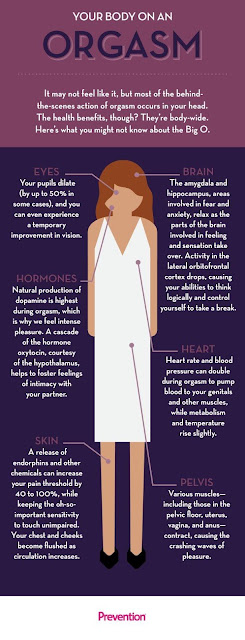Illustration by Tantika Tivorat
Sources: Beverly Whipple, PhD, a professor at Rutgers University; BBC Science; Pain; Psychological Reports; The Journal of Sexual Medicine; Cephalalgia; The Science of Orgasm
We feel good everytime we experience an orgasm, don't we? This video below would explain why.
Video: WebMD
What is an orgasm?
Orgasm is a physical reflex, usually a pleasurable one, when the muscles that were tightened during sexual arousal relax and the body returns to its pre-arousal state. During sexual arousal there is increased blood flow to the genitals and tensing of muscles throughout the body and particularly in the genitals. Orgasm reverses this process through a series of rhythmic contractions.
Orgasm (from Greek ὀργασμός orgasmos "excitement, swelling"; also sexual climax) is the sudden discharge of accumulated sexual excitement during the sexual response cycle, resulting in rhythmic muscular contractions in the pelvic region characterized by sexual pleasure.
Experienced by males and females, orgasms are controlled by the involuntary or autonomic nervous system.
They are often associated with other involuntary actions, including muscular spasms in multiple areas of the body, a general euphoric sensation and, frequently, body movements and vocalizations. The period after orgasm (known as the refractory period) is often a relaxing experience, attributed to the release of the neurohormones oxytocin and prolactin as well as endorphins (or "endogenous morphine").
Orgasm in women
For people with vulvas, contractions occur in the lower part of the vagina, in the uterus, anus, and pelvic floor. About 10 percent of people with vulvas also ejaculate fluid from the urethra at orgasm.
In women, an intense, pleasurable release of sexual tension is accompanied by contractions of the genital muscles. A woman may be able to experience more than one orgasm shortly after the first, if she continues to be stimulated. A minority of women may ejaculate; a clear fluid spurts from glands close to the urethra during intense sexual excitement or during orgasm. The glands are called the Skene’s glands.
Orgasm in men
For people with penises, contractions occur in the penis, anus, and pelvic floor and most will experience ejaculation from the penis at orgasm.
In men, muscle contractions cause semen containing sperm to spurt out of the penis (ejaculation). After this, a man cannot have another orgasm for a while. This recovery phase, in which the penis and testicles shrink back to their normal size, can last from a few minutes to a few hours.
Let's play. Here is an orgasm quiz. Look up how much you know about the Big O.
Source:
WebMD-Orgasm Quiz
WebMD-Video
Prevention Magazine
Brown University-Sexual Health-Sex 101-Orgasm
Wikipedia-Orgasm
NHS UK - What is an orgasm?

Urgent need Female for (egg donation) /(kidney donors) with the sum of $500,000.00,whatsapp +91 9945317569
ReplyDeleteEmail: jainhospitalcare@gmail.com
Hello everyone, I want to say a special thanks to Dr OGU. for helping me get cured from herpes virus 2019 , I contacted him base on the testimonies I saw about him on the internet I was diagnosed of HERPES Virus i have tried all I can to get cured but all to know avail, until i saw a post in a health forum about a herbal man who prepare herbal medication to cure all kind of diseases including HERPES virus, at first i doubted if it was real but decided to give it a try I was cured by his herbal medicine and natural herbs, kindly contact him today through his email: drogugusolutionhome@gmail.com or text/call: +1 (719) 629 0982
ReplyDeleteHe’s waiting to help you.
HE ALSO SPECIALIZE IN THE FOLLOWING Illness;
If you have any sickness like : H I V/AIDS , CANCER , HERPES HSV 1 or 2 , GENITAL WARTS, Yeast-infection's (HPV), and Hepatitis A, B. liver diseases , Stroke, Chlamydia, Genital herpes, Alzheimer’s, Trichomoniasis , Tuberculosis, CAD, Gonorrhea, Epilepsy, and Syphilis.